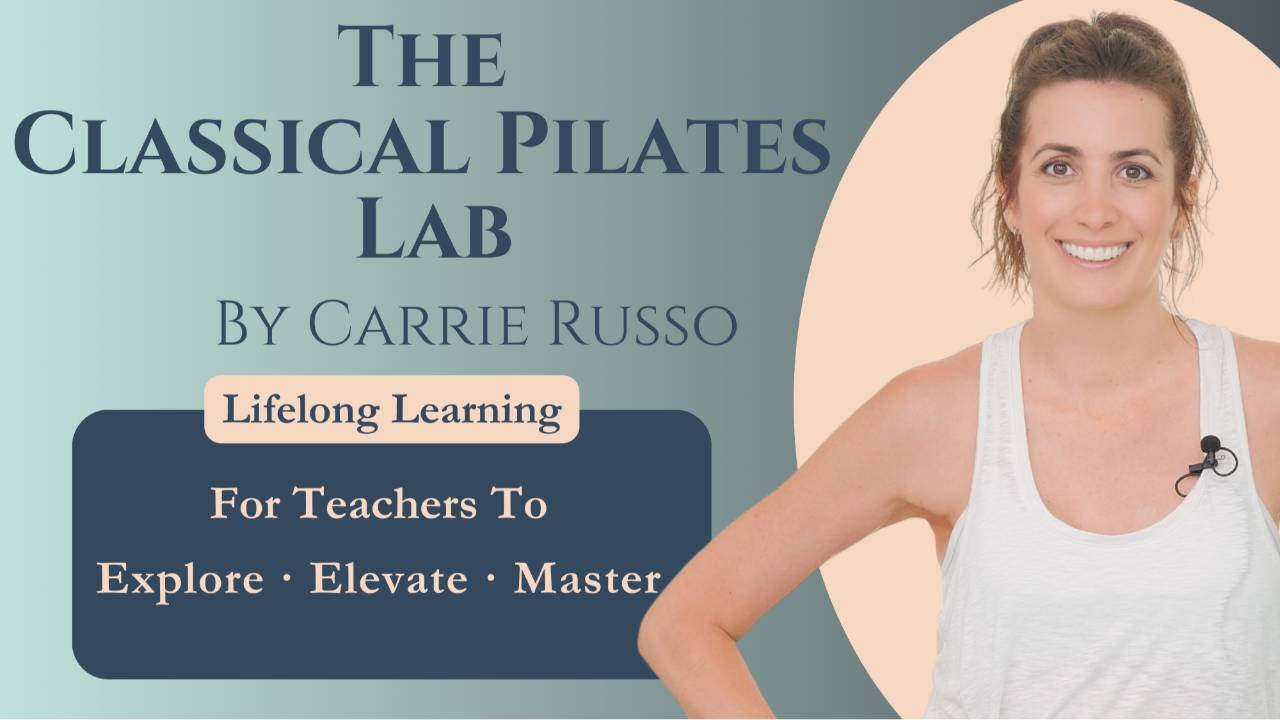See the Body, Teach the Body:
Free Look Inside The Classical Pilates Lab
Replay expires: Sunday, October 5th @ 11: 59pm
Please watch as many times as you'd like before then!
Click the button below to learn more about how The Classical Pilates Lab can help you be a master your teaching skills.
The Classical Pilates Lab
Timestamps:
The Classical Pilates Lab continues to build a strong, supportive community that connects teachers worldwide with a unique mentorship experience (00:00).
-
The Lab offers live sessions five times monthly, including tutorials and Q&A, fostering real-time learning and peer support (00:00)
-
Carrie Russo founded the Lab five years ago as Carrie's Mentorship Program, evolving into a specialized teacher community.
-
Monthly tutorials focus on specific topics like hip and knee injuries, with live demonstrations and corrections for diverse body types.
-
The community spans globally.
-
-
Members benefit from personalized feedback and shared learning to improve teaching skills (52:57)
-
Lisa, a first-time participant, highlighted the value of reconnecting with forgotten cues and feeling less isolated as a teacher.
-
The Lab’s culture prioritizes support over criticism, creating a safe space for experimentation and growth.
-
Sessions are recorded and made available in the portal for ongoing access and review.
-
Effective Pilates teaching relies on adapting cues and corrections to individual body needs, with a focus on purposeful movement rather than strict form (03:31).
-
Carrie demonstrated the power of specific, imagery-based cues to improve exercise form across varied body types (05:28)
-
Using positive “to-do” cues rather than “don’t” instructions improves client focus and results (09:10)
Carrie emphasized adapting Pilates exercises for postpartum bodies and addressing individual musculoskeletal differences to ensure safe and effective practice (05:28).
-
Bella, six weeks postpartum, highlighted special considerations for early postnatal Pilates (31:02)
-
Julie and Kim’s differing postural needs demonstrated the importance of personalized range and cue selection (39:32)
Live demonstrations illustrated the value of real-time visual and tactile feedback to correct complex Pilates movements and optimize muscle engagement (21:16).
-
Frannie’s right-side hip weakness was identified and addressed through targeted touch and imagery (21:16)
-
Multiple cues were tested to find optimal engagement patterns for challenging moves like rowing and pull-ups (34:27)
The Classical Pilates Lab’s process promotes continuous learning through observation, discussion, and immediate feedback, improving teaching quality and client outcomes (00:00).
-
Sessions are structured to include multiple bodies performing the same exercises for comparative learning (03:31)
-
Carrie spotlights different teachers to illustrate how the same exercise looks on various body types and skill levels.
-
This comparative approach strengthens teachers’ ability to “see the body” and customize instruction.
-
Real-time corrections and dialogue encourage peer learning and sharing of best practices.
-
The Lab fosters a culture where imperfection is accepted as part of learning and growth.
-
RECAP:
-
The Lab’s ongoing monthly themes and Q&A sessions deepen understanding of exercise purposes and teaching philosophy (00:00)
-
Topics like “Power of the Purpose” help teachers align movement corrections with the underlying goals of each exercise.
-
Q&A sessions address a wide range of practical concerns, from client issues to pricing strategies, enhancing business and teaching skills.
-
This holistic approach supports both technical mastery and professional development.
-
Members gain access to a comprehensive portal with tutorials and replays, supporting flexible, asynchronous learning.
-

